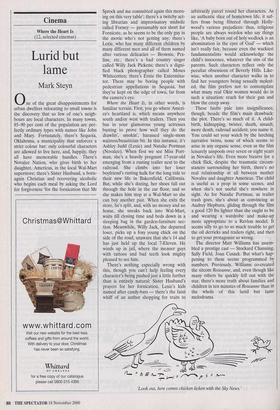Cinema
Where the Heart Is (12, selected cinemas)
Lurid but lame
Mark Steyn
One of the great disappointments for urban dwellers relocating to small towns is the discovery that so few of one's neigh- bours are local characters. In many towns, 85-90 per cent of the population are per- fectly ordinary types with names like John and Mary. Fortunately, there's Sequoia, Oklahoma, a municipality that enforces a strict colour bar: only colourful characters are allowed to live here, and, happily, they all have memorable handles. There's Novalee Nation, who gives birth to her daughter, Americus, in the local Wal-Mart superstore; there's Sister Husband, a born- again Christian and recovering alcoholic who begins each meal by asking the Lord for forgiveness 'for the fornication that Mr Sprock and me committed again this morn- ing on this very table'; there's a twitchy act- ing librarian and improvisatory midwife called Forney — presumably not short for Fornicate, as he seems to be the only guy in the movie who's not getting any; there's Lexie, who has many different children by many different men and all of them named after various delicacies — Brownie, Pra- line, etc.; there's a bad country singer called Willy Jack Pickens; there's a digni- fied black photographer called Moses Whitecotten; there's Ernie the Extermina- tor. There may be boring people with pedestrian appellations in Sequoia, but they're kept on the edge of town, far from the camera's eye.
Where the Heart Is, in other words, is familiar terrain. First, you go where Ameri- ca's heartland is, which means anywhere south and/or west with trailers. Then you bus in your glamorous young actresses busting to prove how well they do the drawlin', smokin', harassed single-mom waitress/beautician bit. In this instance, it's Ashley Judd (Lexie) and Natalie Portman (Novalee). When first we see Miss Port- man, she's a heavily pregnant 17-year-old emerging from a rusting trailer next to the railroad. She climbs into her loser boyfriend's rusting hulk for the long ride to their new life in Bakersfield, California. But, while she's dozing, her shoes fall out through the hole in the car floor, and so she makes him stop at a Wal-Mart so she can buy another pair. When she exits the store, he's split, and, with no money and no home, she sneaks back into Wal-Mart, waits till closing time and beds down in a sleeping bag in the garden-furniture sec- tion. Meanwhile, Willy Jack, the departed loser, picks up a foxy young chick on the side of the road, unaware that she's 14 and has just held up the local 7-Eleven. He winds up in jail, where the meaner guys with tattoos and bad teeth look mighty pleased to see him.
There's nothing especially wrong with this, though you can't help feeling every character's being pushed just a little further than is entirely natural: Sister Husband's prayers for her fornication, Lexie's kids named after candy-bars — there's the faint whiff of an author shopping for traits to arbitrarily parcel round her characters. As an authentic slice of hometown life, it suf- fers from being filtered through Holly- wood's various prejudices: thus, religious people are always weirdos who say things like, 'A baby born out of holy wedlock is an abomination in the eyes of God' — which isn't really fair, because even the wackiest fundamentalists would acknowledge the child's innocence, whatever the sins of the parents. Such characters reflect only the peculiar obsessions of Beverly Hills. Like wise, when another character walks in to find her youngsters being sexually molest- ed, the film prefers not to contemplate what many real Okie women would do in such a situation: reach for their gun and blow the creep away.
These faults pale into insignificance, though, beside the film's main drawback: the plot. There's so much of it. A child- birth, kidnapping, twister, death, assault, more death, railroad accident, you name it. You could set your watch by the lurching narrative twists, none of which seems to arise in any organic sense, even as the film leisurely unspools over seven or eight years in Novalee's life. Even more bizarre for a chick flick, despite the traumatic circum- stances surrounding her birth, there's no real relationship at all between mother Novalee and daughter Americus. The child is useful as a prop in some scenes, and when she's not useful she's nowhere in sight. As for Natalie Portman, as trailer trash goes, she's about as convincing as Audrey Hepburn, gliding through the film a good 120 lbs lighter than she ought to be and wearing a wardrobe and make-up more appropriate to a Revlon model. It seems silly to go to so much trouble to get the oil derricks and trailers right, and then to get your protagonist so wrong.
The director Matt Williams has assem- bled a prestige cast — Stockard Channing, Sally Field, Joan Cusack. But what's hap- pening to them seems programmed by numbers. Previously, Williams co-created the sitcom Roseanne, and, even though like many others he quickly fell out with the star, there's more truth about families and children in ten minutes of Roseanne than in the whole of this lurid but lame melodrama.
`Look out, here comes chicken licken with the Sky News.'


































































































 Previous page
Previous page